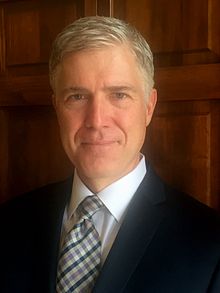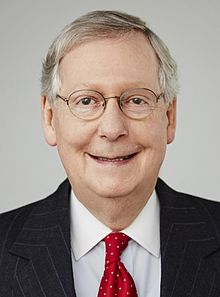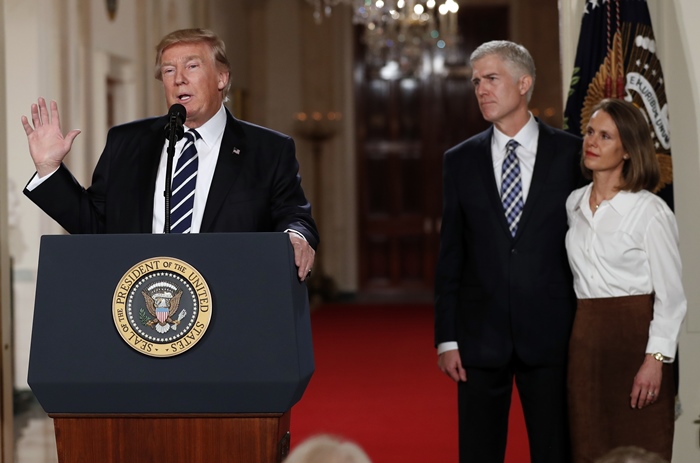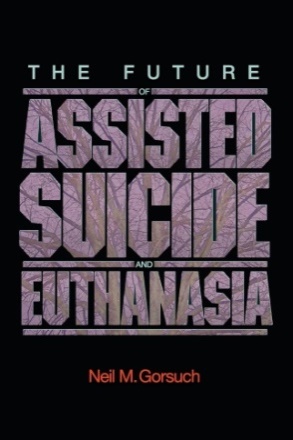
Judge Neil McGill Gorsuch was born in 1967.
On April 7, 2017, Judge Neil M. Gorsuch was confirmed by the Senate. It was a triumph for President Donald J. Trump, who campaigned in 2016 with a pledge to appoint another conservative to succeed Justice Antonin Scalia, who died on February 12, 2016. Supreme Court Justice Neil Gorsuch, 49, could serve on the court for many years. President Trump stated that “As a deep believer in the rule of law, Judge Gorsuch will serve the American people with distinction as he continues to faithfully and vigorously defend our Constitution.” The vote was 54-45 in favor of confirmation.
Senate Minority Leader Charles Schumer (Democrat from New York) opposed the confirmation of Judge Gorsuch from the very beginning and said recently the following: “When Judge Gorsuch goes before the Judiciary Committee… He’ll have to answer for his decisions. Not his empathetic words about the decisions he wrote that favored the powerful over the powerless.”
On January 31, 2017, President Donald J. Trump fulfilled an important campaign promise and nominated a conservative judge, Neil Gorsuch, to be an Associate Justice of the Supreme Court to fill the seat left vacant after the death of Justice Antonin Scalia. Only minutes after the announcement, Senate Minority Leader Charles E. Schumer announced plans for a filibuster to block the judge. Senator Jeff Merkley (Democrat from Oregon), who is also responding to the radical base of his party, lead fellow Democrats in the Senate on a mission to filibuster any nominee by President Trump as a payback for the treatment of Judge Merrick B. Garland whose nomination was not acted upon by the Republicans in the Senate during the last year in office of President Obama. Democratic senators refused to remember that Senator Schumer said that the Democrats would not confirm any justice to the Supreme Court that President George W. Bush would nominate in his last two years in office.
Senate Democrats confirmed Neil M. Gorsuch for the federal bench in 2006 by a unanimous voice vote, including support from senators Chuck Schumer, Barack Obama, Joe Biden, and Hillary Clinton. Judge Gorsuch had strong bipartisan support in the legal community among Republicans and Democrats. Since January 31, 2017, Judge Gorsuch has met with more than 70 senators. He has submitted to the Senate Judiciary Committee more than 175,000 pages of his decisions, speeches, and past writings.

Mitch McConnell has been the Republican Majority Leader of the Senate since January 3, 2015.
On March 20, 2017, the Wall Street Journal reported the following: “According to a person familiar with the matter, Judge Gorsuch has spent several weeks at the Eisenhower Executive Office Building adjacent to the White House preparing for the hearings. In sessions that could last 8 to 10 hours a day, Judge Gorsuch reviewed case law and his own decisions with the assistance from the White House Counsel’s Office. Staff members also created a mock Senate committee room for him.”
Democratic senators insisted without success that the nomination clear a procedure hurdle that requires 60 votes. Since Republicans control 52 seats in the Senate, they would have needed to have eight Democratic senators to support the nominee. President Donald J. Trump had asked Republicans in the Senate to exercise the so-called nuclear option, which is a change in the rules of the Senate, to eliminate the 60-vote threshold for filibusters. Senate Democrats, under the leadership of Senate Minority Leader Charles Schumer, led a never before filibuster on a Supreme Court Justice. Senate Republican Majority Mitch McConnell leader, as he had promised, implemented the nuclear option. On April 6, 2017, the Senate Republican members voted to change the rules on the confirmation of justices of the Supreme Court to confirm with 51 votes in the Senate. Judge Gorsuch was confirmed the following day.
Judge Neil Gorsuch is an Excellent Appointment to the Supreme Court

President Donald J. Trump nominated a conservative judge, Neil Gorsuch, to be an Associate Justice of the Supreme Court. The president appeared with Judge Gorsuch and his wife Louise.
On January 31, 2017, President Donald J. Trump nominated a conservative judge, Neil Gorsuch, to be an Associate Justice of the Supreme Court to fill the seat left vacant after the death of Justice Antonin Scalia. As he introduced his nominee in the East Room of the White House, President Trump said that Judge Gorsuch was “the very best judge in the country.” President Trump added the following: “I took the task of this nomination very seriously. Millions of voters said this was the single most important issue to them when they voted for me. I am a man of my word. I will do what I say, something that people has been asking for in Washington for a very long time…Judge Gorsuch has outstanding legal skills, a brilliant mind, tremendous discipline, and has earned bipartisan support.”
After the president introduced him, Judge Gorsuch stated the following: “The president had trusted me with a most solemn assignment. Justice Scalia was a lion of the law. Agree or disagree with him, all of his colleagues on the bench shared his wisdom and his humor. And like them, I miss him. In our legal order it is for Congress and not the courts to write new laws. It is the role of judges to apply, not alter, the work of the people’s representatives. A judge who likes every outcome he reaches is very likely a bad judge.”
Judge Gorsuch promised that, if confirmed, he would labor to live up to the standard set by Justice Antonin Scalia, whose death in February 2016 created the vacancy. He cast himself firmly in the Scalia mold of a judge who would not place his own views over his duty to follow the law.
In September 2016, during the presidential campaign, Donald J. Trump promised that he would choose a conservative judge similar to Justice Antonin Scalia. He presented the nation a list of 21 conservative judges that were submitted by him by several conservative organizations which included the name of Judge Neil Gorsuch.
As the president said, millions of individuals in the nation voted for him on his promise to nominate conservatives to the Supreme Court. Millions were worried that if Hillary Clinton won the presidential election, she would appoint extreme leftist liberal judges to the Supreme Court of the nation.
On May 10, 2006, Neil Gorsuch was nominated by President George W. Bush to the United States Court of Appeals for the Tenth Circuit. Two months later, on July 20, 2006, Neil Gorsuch was confirmed unanimously by the Senate. He has previously been recommended by the American Bar Association, which is mostly a liberal group.
Judge Gorsuch is a proponent of all originalism and textualism in interpreting the Constitution. This means that, as he stated in the White House, he will be “a faithful servant of the Constitution and the laws of the nation.” He will not be an activist judge who would legislate from the Supreme Court as many liberal judges have done over the years. He will interpret the laws passed by Congress and the president in terms of the Constitution.
Wikipedia has an excellent biography of Judge Neil Gorsuch. The information below has used Wikipedia and other sources as well.
Early life and education
Neil Gorsuch was born in Denver, Colorado and grew up in Washington, D.C. His father is David Gorsuch. His mother, Anne Gorsuch Burford, was appointed by President Ronald Reagan as the first woman to head of the Environmental Protection Agency. Neil Gorsuch is Episcopalian.
Judge Gorsuch’s academic credentials are beyond reproach. He has graduated from the best universities in the world. In 1988, he received a Bachelor’s of Art degree with honors from Columbia University. While a student at that university, he wrote articles for the Columbia Daily Spectator, the student newspaper. He also co-founded an alternative conservative student newspaper, The Fed.
Neil Gorsuch graduated from Harvard Law School with honors in 1991. One of his classmates at Harvard Law School was former President Barack Obama. Judge Gorsuch received a Marshall Scholarship to attend the University College at Oxford University. He received a Doctor of Philosophy in Law degree in 2004.
Career
Neil Gorsuch had outstanding judges as mentors. He clerked for Judge David B.Sentelle in the United States Court of Appeals for Washington, D.C. from 1991 to 1992 and then for the United States Supreme Court with justices Byron White and Anthony Kennedy from 1993 to 1994. Justice Kennedy, age 80, still serves on the highest court of the land.
During the following 10 years, Neil Gorsuch was a lawyer at the Washington, D.C. law firm of Kellogg, Huber, Hansen, Todd, Evans, and Figel. From 2005 to 2006, he served as Principal Deputy to the Associate Attorney General, Robert McCallum, at the Department of Justice. He served as a Visiting Professor at the University of Colorado Law School.
United States Court of Appeals for the Tenth Circuit
On May 10, 2006, Gorsuch was nominated by President George W. Bush to the United States Court of Appeals for the Tenth Circuit. He was unanimously confirmed by the Senate. Below are some of his most important rulings:
Money in politics
Judge Gorsuch issued a ruling stating that giving money to politicians while running campaigns is a “fundamental right” that should be afforded the highest standard of constitutional protection, known as strict scrutiny.
Freedom of religion
Judge Gorsuch is a defender of the freedom of religion. In two rulings, Judge Gorsuch sided with Christian employers and religious organizations. These were the cases of Hobby Lobby Stores versus Sebelius and the case of Little Sisters of the Poor. In the Hobby Lobby case, Judge Gorsuch held that the requirement in ObamaCare or the Affordable Care Act that employers provide insurance coverage for contraceptives without co-pay violated the rights of those employers that object the use of contraceptives on religious grounds.
Judge Gorsuch wrote the following: “The Affordable Care Act’s mandate requires them to violate their religious faith by forcing them to lend an impermissible degree of assistance to conduct their religion teaches to be gravely wrong. And as we have seen, it is not for secular courts to rewrite the religious complaint of a faithful adherent, or to decide whether a religious teaching about complicity imposes ‘too much’ moral disapproval on those only ‘indirectly’ assisting wrongful conduct. Whether an act of complicity is or isn’t ‘too attenuated’ from the underlying wrong is sometimes itself a matter of faith we must respect.”
The Hobby Lobby case was a high-profile religious liberty case that later was reviewed by the Supreme Court. Judge Gorsuch wrote a concurring opinion, which asked the court to decide if the 1993 Religious Freedom Restoration Act allows a closely held for-profit company to deny its employees contraceptive coverage based on religious objections. His opinion was largely vindicated when the Supreme Court ruled in a 5-4 decision in favor of Hobby Lobby.
Death penalty
Judge Gorsuch favors a strict reading of the Antiterrorism and Effective Death Penalty Act of 1996. In a 2003 case, Judge Gorsuch denied requests of death-row inmates seeking to escape executions.
Legal philosophy
Judge Gorsuch believes in what has been described as originalism, which means that the Constitution should be interpreted as the Founding Fathers would have interpreted it. He also believes in textualism, which is the idea that statutes should be interpreted literally, without considering the legislative history and underlying purpose of the law. He is opposed to judicial activism. He has stated that judges should strive “to apply the law as it is, focusing backward, not forward, and looking to text, structure, and history to decide what a reasonable reader at the time of the events in question would have understood the law to be—not to decide cases based on their own moral convictions or the policy consequences they believe might serve society best.”
Judge Gorsuch wrote an article in 2005 which was published by the magazine National Review. He said in that article the following: “This overweening addiction to the courtroom as the place to debate social policy is bad for the country and bad for the judiciary. In the legislative arena, especially when the country is closely divided, compromises tend to be the rule the day. But when judges rule this or that policy unconstitutional, there’s little room for compromise: One side must win, the other must lose. In constitutional litigation, too, experiments and pilot programs–real-world laboratories in which ideas can be assessed on the results they produce–are not possible. Ideas are tested only in the abstract world of legal briefs and lawyers’ arguments. As a society, we lose the benefit of the give-and-take of the political process and the flexibility of social experimentation that only the elected branches can provide.”
“At the same time, the politicization of the judiciary undermines the only real asset it has–its independence. Judges come to be seen as politicians and their confirmations become just another avenue of political warfare. Respect for the role of judges and the legitimacy of the judiciary branch as a whole diminishes. The judiciary’s diminishing claim to neutrality and independence is exemplified by a recent, historic shift in the Senate’s confirmation process. Where trial-court and appeals-court nominees were once routinely confirmed on voice vote, they are now routinely subjected to ideological litmus tests, filibusters, and vicious interest-group attacks. It is a warning sign that our judiciary is losing its legitimacy when trial and circuit-court judges are viewed and treated as little more than politicians with robes.”
Abortion
Judge Gorsuch has never written an opinion on Roe versus Wade. However, many believe that based on the opinions expressed in his book opposing euthanasia and assisted suicide, he may tend to rule in favor of pro-life in abortion-related cases in the future.
Euthanasia
 Judge Gorsuch wrote the book The Future of Assisted Suicide and Euthanasia (2009). Judge Gorsuch offered the most thorough overview of the ethical and legal issues raised by assisted suicide and euthanasia–as well as the most comprehensive argument against their legalization–ever published. He evaluated the strengths and weaknesses of leading contemporary ethical arguments for assisted suicide and euthanasia. He reviewed the evidence and case histories from the Netherlands and Oregon, where the practices have been legalized. Judge Gorsuch analyzed the arguments for legalization as well as the impact of key Supreme Court decisions on the debate. He looked at the history and evolution of laws and attitudes regarding assisted suicide and euthanasia in the U.S. society.
Judge Gorsuch wrote the book The Future of Assisted Suicide and Euthanasia (2009). Judge Gorsuch offered the most thorough overview of the ethical and legal issues raised by assisted suicide and euthanasia–as well as the most comprehensive argument against their legalization–ever published. He evaluated the strengths and weaknesses of leading contemporary ethical arguments for assisted suicide and euthanasia. He reviewed the evidence and case histories from the Netherlands and Oregon, where the practices have been legalized. Judge Gorsuch analyzed the arguments for legalization as well as the impact of key Supreme Court decisions on the debate. He looked at the history and evolution of laws and attitudes regarding assisted suicide and euthanasia in the U.S. society.
After assessing the strengths and weaknesses of arguments for assisted suicide and euthanasia, Neil Gorsuch provided a powerful moral and legal argument against legalization. This argument is based on a principle that, surprisingly, has largely been overlooked in the debate–the idea that human life is intrinsically valuable and that intentional killing is always wrong. At the same time, Judge Gorsuch left wide latitude for individual patient autonomy and the refusal of unwanted medical treatment and life-sustaining care, permitting intervention only in cases where an intention to kill is present.
Those on both sides of the assisted suicide question will find Gorsuch’s analysis to be a thoughtful and stimulating contribution to the debate about one of the most controversial public policy issues of our day. Judge Gorsuch stated that “retaining the laws banning assisted suicide or euthanasia … based on the idea that all human beings are intrinsically valuable and the intentional taking of human life by private persons is always wrong”. He said he was a strong opponent of euthanasia.
States’ rights
Judge Gorsuch was described by a professor at the University of Denver Law School as “a predictably socially conservative judge who tends to favor state power over federal power”.
Personal life
Judge Gorsuch and his wife, Louise, have two teenage daughters, Emma and Belinda, and live in Boulder, Colorado. In addition to his book The Future of Assisted Suicide and Euthanasia, Gorsuch was one of 12 co-authors of The Law of Judicial Precedent (2016).
Conclusion
Majority Leader Mitch McConnell (Republican from Kentucky) delivered on his promise that if Senate Democrats engaged in a filibuster, he would exercise the nuclear option and Judge Neil Gorsuch would be confirmed before the April recess of the Senate. Now Neil Gorsuch will be in the Supreme Court by the time any legal challenge to President Trump’s executive order reaches the court. It is expected that the Supreme Court will rule in favor of President Trump’s temporary ban of citizens from six Middle Eastern countries.
President Donald J. Trump has fulfilled a key promise made during the presidential campaign of nominating conservative justices to the Supreme Court. He nominated one of the most conservative, highly intelligent, and brilliant judges in America. Judge Gorsuch, who is 49 years old, will be the youngest justice in the court. This means that he could stay in the bench for many years. The Supreme Court has again a majority of conservative and moderate justices.
Mat Staver, Founder and Chairman of Liberty Counsel, stated the following: “It’s time to return this country back to the rule of law where judges interpret the original meaning of the Constitution and the laws before them. Judicial activism is destroying the judiciary and will ultimately weaken the role of the judicial in the eyes of the people. The only power that courts have is the trust of the people that judges will act fairly and put aside personal bias. From the Supreme Court to the state courts, the role of judges is to judge fairly. If they want to be legislators, then let them run for office. Judicial activism has no place on the bench.”
Americans need to be very grateful to President Donald J. Trump for delivering on his promise to nominate excellent, competent, and highly intelligent conservative judges to the highest court of the land. Hopefully, during his tenure, the president will have the opportunity to nominate other conservative justices to the Supreme Court.
